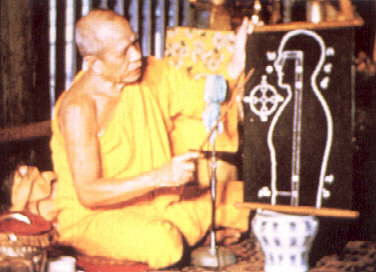Blessing Fifteen:
Generosity
Generosity

B. GENEROSITY
B.1 Definition of Generosity
The Pali word ‘dāna’ means literally ‘to give’. In this Blessing, we take generosity to mean:
‘sacrificing your own possessions for the benefit of other people, wholeheartedly, with the intention to honour the virtue of that person, or to assist a person of similar social standing, or to help someone who is worse off than ourselves.’
If you are not wholehearted about giving then it cannot be called ‘dāna’. The Buddhist usage of the word ‘generosity’ is therefore broader than the equivalent word ‘charity’ in Christian culture which is usually restricted to giving to the poor and the sick. In the spiritual sense, ‘dāna’ sometimes refers to our intention to give, sometimes it refers to the thing we want to give, sometimes it refers to abstention from wrong-doing (e.g. not seeking vengeance from someone who has harmed you). In this particular blessing we will speak of only the first two instances of usage of the word, because we have already mentioned abstention from wrong-doing in Blessing Nine on “self-discipline”.
B.2 Categories of Generosity (A.i.90)
There are two main categories of generosity
1. Concrete generosity [amisadāna]
2. Abstract generosity [dhammadāna]
Material generosity can be subdivided by the quality of the gift:
1. Giving things of worse quality than you would use yourself [dānadāsa]
2. Giving things of equal quality that you would use yourself [dānasahāya]
3. Giving things of better quality than you would use yourself [dānasāmī]
Or by the exclusivity of the gift (M.iii.254-6, A.iii.392)
1. Personal [patipuggalikadāna]
2. Community [saṅghadāna]
Or by the nature of the gift (see BlessingFive @C.2 for further details), generosity can be divided into: giving useful material objects [vatthudāna]; giving worldly knowledge [vidhayadāna]; giving spiritual knowledge [dhammadāna]; forgiving [abhāyadāna]; humility [apacāyana]; service [veyyāvacca]; transfer of merit [pattidāna], and; rejoicing in the merit of others [pattānumodanā].
B.3 Reasons for Giving
Some reasons for giving are less noble than others —therefore it is useful to study the variety available to that we can select the noblest. According to the Buddha’s teaching in the Paṭhama Dāna Sutta [A.iv.236] there are eight different reasons why people give gifts:
1. giving because in the hope of getting something in return [āsajja dānaṃ deti]; Giving because wants something in return. Sometimes people give because they want others to see them doing so, or they want to become famous as the result;
2. giving out of fear [bhayā dānaṃ deti]; Giving out of fear. Some give gifts to others because they are afraid that if they don’t give something the recipient will create problems for them (e.g. protection money). Such giving can even include being scared someone won’t love us so we give them things to win their love;
3. giving in order to repay past favours [adāsi me ti dānaṃ deti]; Giving in order to repay a debt of gratitude we have to someone else;
4. giving to procure future favours [dāsati me ti dānaṃ deti]; Giving with the thought that the recipient will repay our favour in the future — e.g. Mr.A gives Mr.B some sweets so that the next day he can invite himself to eat a meal at Mr.B’s house;
5. giving for giving’s sake [sāhu dānaṃ ti dānaṃ deti]; Giving for the joy of it — perhaps because spontaneously inspired by a particular monk or seeing a group of children without transport to go to the temple and gladly paying the cost of hiring a bus for them.
6. giving out of sympathy for the monks [ahaṃ pacāmi, ime na pacanti, na arahāmi pacanto apacantānaṃ adātunaṃ ti dānaṃ deti]; Knowing that monks cannot cook rice or catch fish to feed themselves out of fear that the monks will starve one gives them food.
7. giving to improve your reputation [imaṃ me dānaṃ datato kalyāṇo kittisaddo abbhuggacchatī ti dānaṃ deti], not just out of greed for praise, but because indeed generosity is a praiseworthy behaviour, and;
8. giving in order to improve the quality of the mind [cittālankāra cittaparitkkhāratthaṃ dānaṃ deti].
Two further possible reasons are noted in the Dānavatthu Sutta A.iv.236:
1. Giving out of family tradition [dinnapubbaṃ katapubbaṃ pitu pitāmahehi na arahāmi porāṇaṃ kulavaṃsaṃ hāpetu ti dānaṃ deti]: Giving only because your ancestors have always made a tradition of giving and you don’t want to be the odd one out.
2. Giving because you want to go to be reborn in heaven [imāhaṃ dānaṃ datvā kāyassa bhedā parammaraṇā sugatiṃ saggaṃ lokaṃ upapajjissāmī ti dānaṃ deti]
The first four reasons are no more than ways to keep up good relationships with the people around us. We want others to remember us for our goodness — it is the only reason for giving. There is no merit in such giving. This is the sort of giving which politicians like to do in order to win votes or of shops wanting to boost their sales by giving away free gifts. The remaining reasons are all types of giving which are done for merit; however people differ as to the extent they see the true nature of merit in what is given. In this blessing we will try to go as deep as we can, i.e. to discover the sort of giving that is going to improve the quality of the mind.










